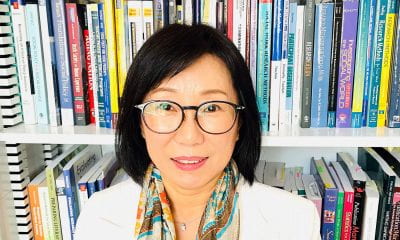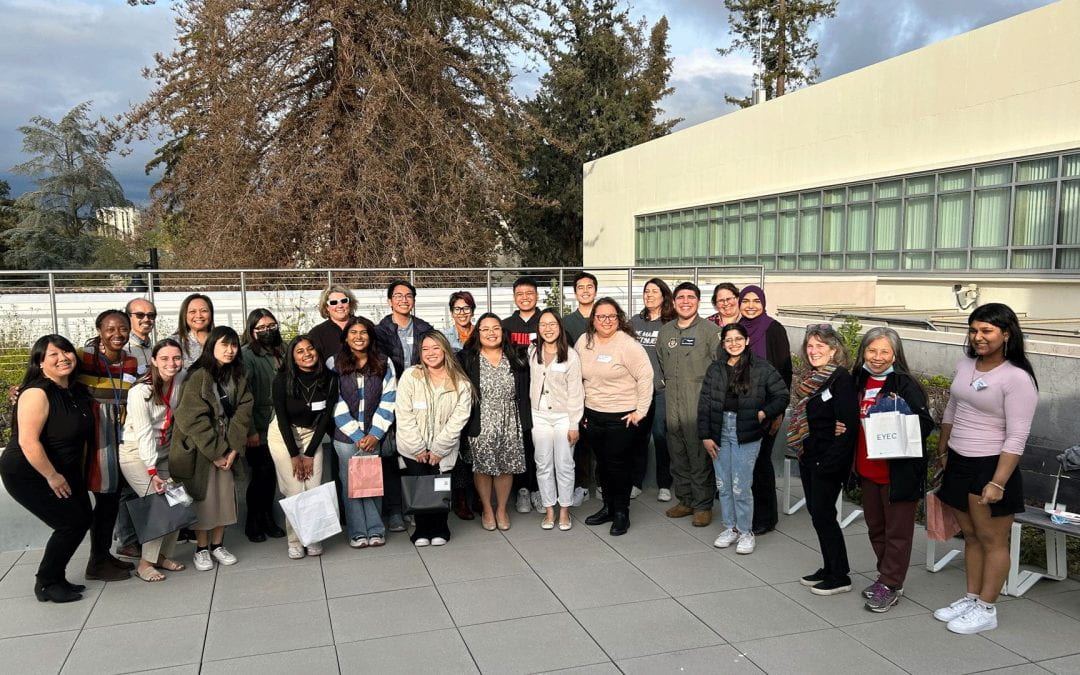Meekyung Han Wants to Improve Asian (and Asian-American) Mental Health
At first, Meekyung Han was studying for a bachelor’s degree in chemistry. But during her time as an undergraduate in South Korea, she discovered her true passion: social work. It began with volunteering, working with people with disabilities and other vulnerable populations.
“I fell in love with what social workers do,” she remembers. “Being out there working with people, helping people, empowering them. I felt like, Okay, this is my calling. Every single moment I was filled with joy, enthusiasm, appreciation, grace and gratitude — you name it.”

Meekyung Han, professor of social work.
Han, a professor of social work, came to San José State in 2005 because her husband had been working in Santa Clara County — in fact, at that point in her career SJSU was the only place she applied to. “I didn’t want to go any other place,” she says. “I just love what San José State offers: a teaching university, student-focused work, community relations, diversity and embracing inclusion.”
The focus of her research and scholarly work is the promotion of well-being within the Asian-American community. More specifically, her current projects are concerned with exploring the challenges faced by family caregivers of individuals who suffer from serious mental illnesses within this population. Through her research endeavors, she aims to improve the lives of those affected by mental illness and provide support for their caregivers.
Coming to America
After completing her undergraduate degrees in chemistry and social work, Han came to the United States to study the child welfare system. She wanted to make an impact on child welfare in South Korea, and believed that she needed to study in a Western country with a more developed system. After obtaining her Master’s degree in social work, she worked in Child Protective Services (CPS) to gain a better understanding of the.
She called the move to Missouri a “culture shock” but was delighted by the kindness of the people there. Still, when she had the opportunity to move to California to study at UC Berkeley, she jumped on it. For one thing, she wanted to address deeper issues she was seeing in her cases.
“Through my graduate studies, internships and work experience working with children and families in the child welfare system,” she says, “one thing that really struck me was the impact of trauma on the child and families as a whole. And I felt like without addressing that properly, the trauma would be transmitted intergenerationally. So when I came to Berkeley, I thought I’d study child welfare while focusing more specifically on the trauma of the children and the families.”
De-Stigmatizing Mental Health Issues
Her California move also affected another focus of her research. “Moving to California gave me the opportunity to work with Asian Americans and Asian immigrants,” she explains.
“When I started interacting with Asian Americans and Asian immigrants, I noticed that they often faced culturally-related family issues, such as intergenerational conflicts between the parents who acculturated to this country slower than their children, who acculturated faster through schooling. And I became more interested in how these conflicts cause mental health issues for both parents and children. I met so many people struggling with various types of mental health issues, but they did not necessarily seek help, because of stigma and cultural and contextual barriers. So I was trying to understand how to help them.”
She’s also a project specialist (along with five other SJSU faculty) for the Asian-American Native Hawaiian Pacific Islanders (AANHPI) Ohana Center of Excellence. This Substance Abuse and Mental Health Services Administration (SAHMSA) funded project, in collaboration with multiple organizations, including the Hawaii Department of Health, seeks to “provide trainings, resources and technical assistance to behavioral health providers and communities who are serving the AANHPI populations.”
The project is only in the first year of its five year grant, but Han and her fellow researchers hope to make this virtual center a “one-stop shop for anybody who wants to learn about behavioral health in the AANHPI communities.”
Han’s particular responsibilities include providing workshops, delivering training and technical assistance to behavioral health care practitioners and the communities, recruiting and facilitating the regional steering committee for the center, and collaborating with prospective workshop/training experts throughout the workshop process.
A Rising Star
Her work has also been widely recognized: this year she received the College of Health and Human Sciences (CHHS’) Senior Scholarly Excellence Award, and she was named a Fellow by the Society for Social Work and Research (SSWR) in 2018, which recognizes “research that addresses issues of social work practice and policy and promotes a diverse, equitable and just society.” Han is the only CSU social work professor to have received this honor so far.
She’s also been named a “Shining Star of Excellence” by Momentum for Health and received a letter of commendation from the mayor and the City of San José for her work de-stigmatizing mental health issues. She says she’s “extremely humbled and honored” to receive these recognitions.
In her nominating letter for the Scholarly Excellence Award, Han’s colleague and fellow professor of social work Amy D’Andrade said, “Her work has made significant contributions to the amelioration of mental health system inequities and disparities, an important social justice issue.”
She went on to list Han’s many international and national accomplishments, including her work in South Korea as a leading social welfare scholar, and concluded, “Dr. Han operates with 100% integrity in everything she does, all of the time. Her excellence in her scholarly work is not driven by ego or striving for acclaim, but from a deep desire to improve conditions. This combination of excellence, humility, and integrity is an inspiration to her students and to her colleagues who know her well.”
”Even if I didn’t receive recognition, I would still have continued doing the same things,” Han says. “However, being recognized has greatly motivated me, and it has spurred me to work even harder. I have a great fondness for my school, colleagues, and students. Until my retirement, I will stay committed to this profession.”




